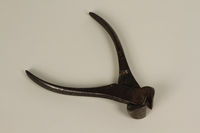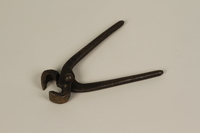Overview
- Description
- Documents, correspondence, photographs and album illustrating the experiences of Berthold and Hilde Baer and their son Hans Lothar in Germany surrounding WWII in Germany. Included are military documents for Berthold's WWI service, photographs and albums of pre-war Germany and documents and correspondence surrounding their immigration to the United States via London, England. Documents, photographs and correspondence also illustrate Werner Simon (Hilde's brother) and his wife Eva and their son Daniel, all of whom were killed and information concerning Clara Simon (Werner and Hilde's mother) who was liberated in Theresienstadt.
- Credit Line
- United States Holocaust Memorial Museum Collection, Gift of John L. Baer
Physical Details
- Genre/Form
- Photographs. Photo albums. Identification documents.
- Extent
-
1 box
1 folder
Rights & Restrictions
- Conditions on Access
- There are no known restrictions on access to this material.
- Conditions on Use
- Material(s) in this collection may be protected by copyright and/or related rights. You do not require further permission from the Museum to use this material. The user is solely responsible for making a determination as to if and how the material may be used.
Administrative Notes
- Holder of Originals
-
United States Holocaust Memorial Museum
- Legal Status
- Permanent Collection
- Provenance
- The papers were donated to the United States Holocaust Memorial Museum in 2014 by John Baer.
- Record last modified:
- 2023-02-24 13:44:17
- This page:
- https://collections.ushmm.org/search/catalog/irn96319
Download & Licensing
- In Copyright - Use Permitted
- Terms of Use
- This record is not digitized and cannot be downloaded online.
In-Person Research
- Request 7 Days in Advance of Visit
- Plan a Research Visit
-
Request in Shapell Center Reading Room
Bowie, MD
Contact Us
Also in Baer family collection
The collection consists of two gripper pliers, correspondence, documents, photographs, and a manuscript relating to the experiences of Berthold Baer, his family, and extended family in Germany and the United States before, during, and after the Holocaust. Some of these materials may be combined into a single collection in the future.
Date: 1914-1940

C. Seelbach Co. gripper pliers brought to the US by a German Jewish refugee
Object
Large pair of C Seelbach Co. gripper pliers brought to the United States on October 3, 1940, by Berthold Baer, his wife Hilde, and son Hans (later Larry) from Frankfurt, Germany, via the Netherlands and England. Berthold was a bank official in Frankfurt when Adolf Hitler was appointed chancellor of Germany in 1933. By 1938 the German authorities had passed many anti-Semitic laws that isolated and restricted the everyday lives of the Jews. Berthold was legally barred from working and during Kristallnacht on November 9, he was arrested. On November 13 he was imprisoned for two weeks in Buchenwald concentration camp. In February 1939, Berthold and his family left Germany. On route, the family was stopped at the German border and their valuables were taken from them. They traveled to the Netherlands, then England and went on to the United States in 1940. In the fall of 1942 Berthold’s sisters and their husbands were arrested and deported to Theresienstadt ghetto-labor camp and Treblinka killing center where they were murdered. On March 18, 1943 Hilde’s mother Clara was deported to Theresienstadt. Hilde’s brother Werner, a school director who aided in the escape of over 100 students and faculty from Germany in 1939, was arrested with his wife and young son on October 23, 1944. They were deported to Theresienstadt, and later, Auschwitz concentration camp, where they were killed. Clara was the only member of the Baer’s extended family to survive the Holocaust.

Gripper pliers brought to the US by a German Jewish refugee
Object
Small pair of gripper pliers brought to the United States on October 3, 1940, by Berthold Baer, his wife Hilde, and son Hans (later Larry) from Frankfurt, Germany via the Netherlands and England. Berthold was a bank official in Frankfurt when Adolf Hitler was appointed chancellor of Germany in 1933. By 1938 the German authorities had passed many anti-Semitic laws that isolated and restricted the everyday lives of the Jews. Berthold was legally barred from working and during Kristallnacht on November 9, he was arrested. On November 13 he was imprisoned for two weeks in Buchenwald concentration camp. In February 1939, Berthold and his family left Germany. On route, the family was stopped at the German border and their valuables were taken from them. They traveled to the Netherlands, then England and went on to the United States in 1940. In the fall of 1942 Berthold’s sisters and their husbands were arrested and deported to Theresienstadt ghetto-labor camp and Treblinka killing center where they were murdered. On March 18, 1943 Hilde’s mother Clara was deported to Theresienstadt. Hilde’s brother Werner, a school director who aided in the escape of over 100 students and faculty from Germany in 1939, was arrested with his wife and young son on October 23, 1944. They were deported to Theresienstadt, and later, Auschwitz concentration camp, where they were killed. Clara was the only member of the Baer’s extended family to survive the Holocaust.



